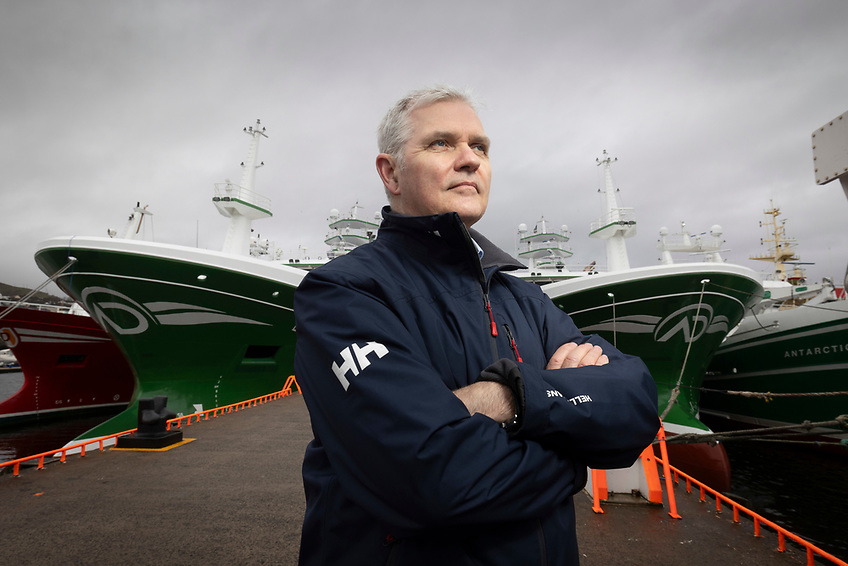Monday 30th September, Brussels: Irish fishing leaders are in Brussels tomorrow to seek MEP’s support on the changes needed to prevent the collapse of their industry. The leaders have formed a new alliance, the Seafood Ireland group, to collaborate on a way forward together.
Landings by Irish vessels fell by a staggering €37m last year, compared to 2022, according to figures from the Sea-Fisheries Protection Authority (SFPA). A reduction of 12% from 2023. Statistics from Bord Iascaigh Mhara (BIM) statistics show a similarly bleak picture with gross profit of the fishing fleet down by a massive 82% in 2023.
Aodh O Donnell of the Irish Fish Producers Organisation (IFPO) says the future viability of the fishing and seafood industries are under serious threat. “We are witnessing adverse impacts across the board, from inshore boats to the largest vessels, targeting pelagic species such as mackerel and herring. This includes the entire onshore fish processing sector which has suffered huge losses in turnover.”
“Unless immediate action is taken, there are fears of widespread business closures and that many Irish fishermen will permanently leave the industry. Meanwhile, non-EU members such as Norway, persistently overfish our shared migratory stocks of mackerel.”
The IFPO is one of 5 representative organisations who have formed the Seafood Ireland alliance. The other members are the Killybegs Fishermen’s Organisation (KFO), the Irish South & West Fish Producer’s Organisation (IS&WFPO), the Irish South & East Fish Producers Organisation (IS&EFPO) and the Irish Fish Processors & Exporters Association (IFPEA).
Accompanied by EU Advisor, Michael Treacy, tomorrow the group is meeting MEPs from Fianna Fáil, Fine Gael and Sinn Féin, and Independent MEP, Kieran Mullooly. KFO chief executive Dominic Rihan says they will be presenting a position paper on the key challenges facing the Irish fishing industry.
“We will also be making clear calls for action on mitigating the impacts of Brexit and reforming the Common Fisheries Policy. It’s time our share of EU quotas reflected our 12% share of the waters.”
Brendan Byrne, chief executive of the IFPEA says they want urgent action to address the huge losses being faced by the fish processing sector. “Profitability across the board is reducing at an alarming rate, with some companies suffering a decline of 300%. Since January 2024, a number fish processors have already closed with the loss of 151 jobs, other companies are down scaling and sheading jobs. Without direct action Ireland could lose 30%–40% of its fish processing capacity within 2 years.”
Byrne says 2024 is set to be “the worst year in the history of Irish fish processing. This reflects extremely poorly on EU policy and on the overall unfairness of the CFP towards Ireland. The reality is that over 85% of the fish caught in Irish waters is caught by EU vessels.”
John Lynch, chief executive of IS&EFPO, says they will also talk to MEPs about the urgent need to implement the recommendations in the last CFP report. “We need to place the Irish fishing
industry back onto a level playing field with our European partners, after the disastrous Brexit outcome for our sector.”
Patrick Murphy, chief executive of IS&WFPO says they will also be raising concerns about the lack of representation of the fishing industry at EU level. “Our presence in Brussels at fisheries negotiations is limited and our input into key policy documents is largely ignored. The information flow from Europe on fisheries issues compared to other Member States, such as the Netherlands and Denmark is minimal. Our industry is forced to rely on its own sources for information and quite often is ‘in the dark’ on the progression on legislative proposals and the state of negotiations.”
“We want the Government to appoint a dedicated Minister of State for the Marine. We also want them to establish an integrated hub and point of contact at the heart of Europe in Brussels to act as a conduit for information between the administrative officials and the industry. “

